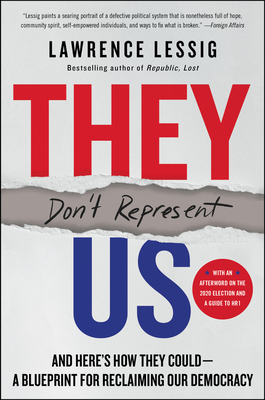What do you think?
Rate this book


400 pages, Paperback
First published January 1, 2019
[Imported automatically from my blog. Some formatting there may not have translated here.]
Lawrence Lessig came to my attention in 2002 when he argued (and to my mind, botched) the case Eldred v. Ashcroft before the Supreme Court, an attempt to challenge the constitutionality of the "Sonny Bono Copyright Term Extension Act". (He lost the case, 7-2.) I knew, from occasional sightings since then, that this book would be out of my confort zone. Lessig is a Progressive Democrat, with all that implies. But he knows the law, and the Constitution, and in this book he sometimes surprised me with occasional libertarian instincts. He's a mixed bag.
But I was most intrigued by the title. I was like: "Dude, I know THEY don't represent US." Specifically, me. Even more specifically: in 2020, my CongressCritter, Democrat Chris Pappas squeaked to re-election with 51.3% of the vote. His main opponent, Republican Matt Mowers, got 46.2%. My vote went to Libertarian Zachary Dumont, who got 2.4%.
In my mind, there is no meaningful way in which Chris Pappas could be said to "represent" me. Or for any of the 48.7% of the voters who preferred someone else. As I type, he's a 100% rubber stamp for Biden, like (to be fair) nearly all his Democrat colleagues. He could be replaced by a suitably programmed robot.
But Lessig has a different view of "representation". Or it's maybe more accurate to say he has multiple views of "representation", but none of them match with mine. For example, he waxes predictably about "gerrymandering", but that wouldn't resolve my issue: Pappas only got 51.3% of the popular vote, but that translates into an entire vote in the House. No matter how the district lines are drawn, it's winner take all, baby. (My crackpot reform idea is here.)
Lessig advocates multimember Congressional districts with ranked-choice voting determining the winners. (More detail at the FairVote advocacy site.) Intriguing, but I suspect that would simply get me represented by N robotic representatives instead of one.
Lessig also supports an Article V Convention for "fixing" the Constitution; public financing of campaigns where every voter is provided an $N dollar voucher they could "donate" to a candidate (whereupon it would turn into actual taxpayer money); "civic juries", a bunch of citizens who would consider various public policy options, considering the testimony of "experts presenting various viewpoints". And other assorted gimmickry to fix things to his imagined liking.
He is a huge fan of the Sarbanes/Pelosi HR1 voting reform act (as it was proposed in 2019). He correctly notes that it was unable to gather a single GOP vote in the House, and was bottled up in the Senate. (The most recent iteration, the "For the People Act" also went nowhere.) He makes no effort to consider the valid Constitutional/Federalism/separation of powers objections.
Gimmicks aside, Lessig's unstated view of government is not the design of the Founders: to protect the inalienable rights of its citizens, and otherwise stay out of the way. Instead, government is essentially there to solve problems. Using "democracy", of course, to both define and solve the problems.
Not that he's examined that premise much. Jason Brennan's critique Against Democracy is dismissed in a single sentence. Bryan Caplan's The Myth of the Rational Voter isn't mentioned at all.
Lessig's prose style is earnest, and occasionally dreadful. What do you do when confronted with a sentence like (p. 56):
But we should neither exaggerate the insignificance of losing presidential public funding nor, and more important for our purposes here, imagine that the economy of influence for funding presidential campaigns is anything like the economy of influence for funding campaigns for Congress.
We shouldn't exaggerate insignificance of losing something. I'm still working on what that might mean.